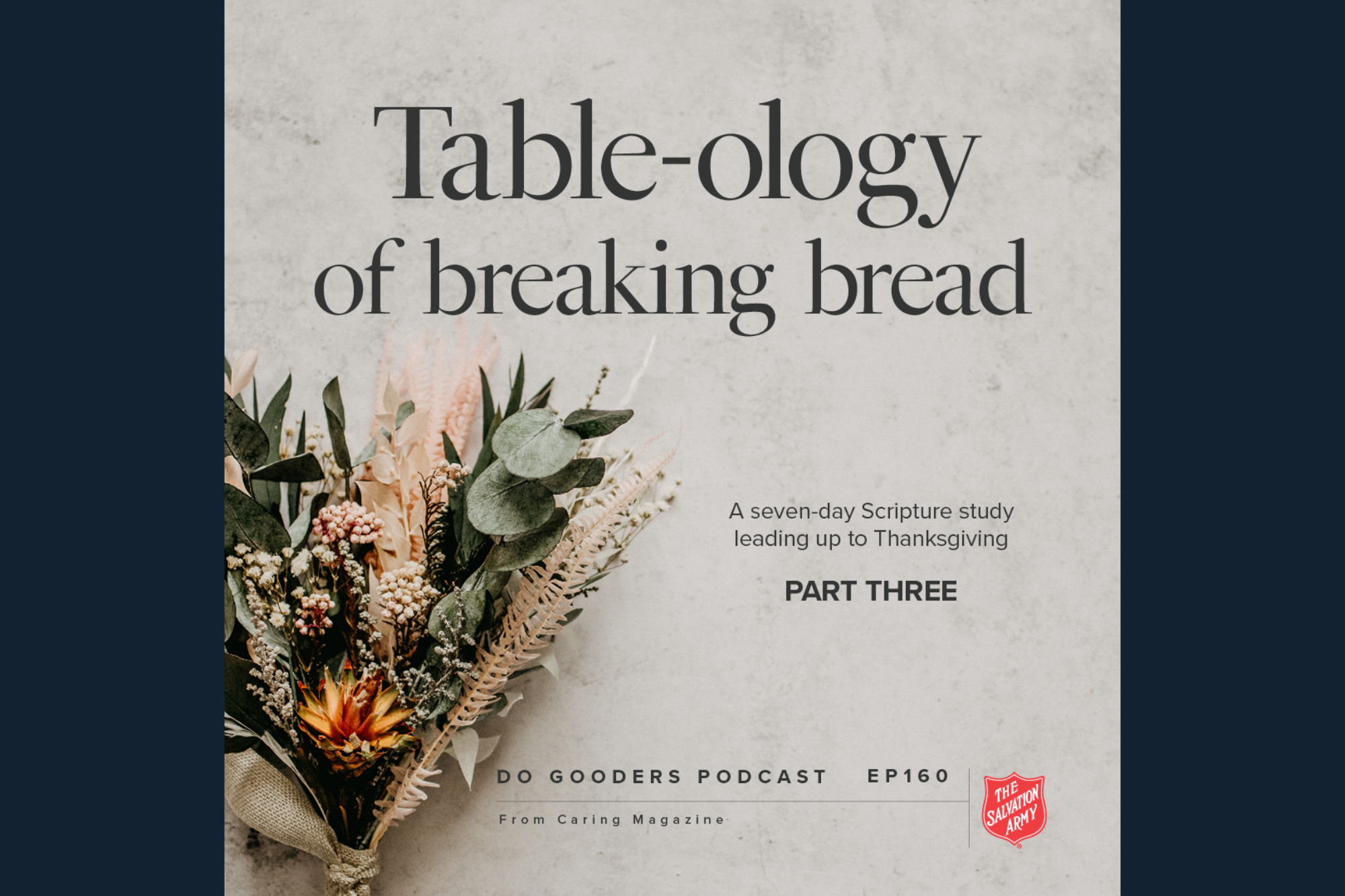A Scripture study from Caring, part three of seven.
One of my favorite foods at a good Thanksgiving feast is a loaf of hot bread, fresh out of the oven. Taking a deep breath and inhaling the tantalizing aroma is enough to get my senses dancing. Slathering a slice in butter and tasting its savory goodness, I’m practically a dancing queen. It nourishes my body and my soul, all at once. I feel the same when I open God’s Word, alone or with others. It brings me to a place of goodness, where God’s Spirit breathes life and truth into me, and I become transformed from the inside out.
Breaking bread at a table, both physically and spiritually, are gifts we shouldn’t take for granted and gifts we should thank God for daily. In Acts 2, we read that the early Church broke bread spiritually (2:42) and they broke bread physically and ate together with glad and sincere hearts (2:45). This experience of fellowship was life-giving for them. As they devoted themselves to the apostles teaching and to fellowship, to the breaking of bread and prayer, everyone was filled with awe (2:42). The Holy Spirit was doing a miraculous work in and among them. The apostles were performing signs and wonders they had never witnessed. They were experiencing the transforming presence of God.
Living with God and others and participating in relationship through his Word can offer us the same transforming experience today. We can celebrate with thanksgiving and praise, as the early Church did, when we open our hearts to the truths of his Word. We can find ourselves sitting at his banquet, receiving his love, mercy and grace. Our eyes can be opened to see God in our very midst. He stirs our innermost being and transforms us into his image. God’s Word is living.
Every part of Scripture is God-breathed and useful one way or another—showing us truth, exposing our rebellion, correcting our mistakes, training us to live God’s way. Through the Word we are put together and shaped up for the tasks God has for us (2 Tim. 3: 16-17). Through God’s Word, we have an invitation to taste and see and learn from and be led by the Bread of Life, himself.
The two disciples on the Road to Emmaus had a physical encounter with the Bread of Life. At first, they didn’t recognize him. He even shared Scripture with them concerning himself and still they couldn’t see. It was at the table that they broke bread with the Bread of Life and their eyes were opened to recognize him (Luke 24:31).
If I could sit with the two disciples who were with Jesus on the Road to Emmaus, and talk to them face to face, I would say to them, “What was it like to sit across from Jesus and break bread with the Bread of Life? Tell me about the burning sensation you felt when he talked with you and opened the Scriptures to you. I think I’ve felt the same sensation. What was it like when your eyes were opened and you recognized Jesus, Messiah, Son of God, Risen Savior? Why do you think it is that you didn’t recognize him on the road?”
When he was at the table with them, he took bread, gave thanks, broke it and began to give it to them. Then their eyes were opened, and they recognized him (Luke 24:30-31).
As they partook of what Jesus offered them, they knew him, and they realized that the conversation they had partaken in on the road was holy and heart stirring. Their encounter with the Bread of Life opened their eyes to the reality of his existence and all that he offered. His presence brought peace, harmony, wholeness, fellowship, sanctity and restoration. We can share in the same eye-opening, heart burning encounter.
At times, we can take God’s inspired Word for granted and miss the blessing that comes from the Bread of Life, himself, who longs to join us and transform us. God desires for us to have hearts that burn within and eyes that see as a result of his Spirit speaking truth to us. For this to be our reality, we have to be intent about creating space with God and others to break bread and become nourished from the inside out. There are some great Sunday sermons, but they aren’t enough.
There are spiritual disciplines we can practice that will enable us to abide in God’s Word and find ourselves in the narratives of its pages. We can practice these disciplines both in community and in solitude. Suggested disciplines to explore are: Lectio Divina, meditation and Bible study. Lectio Divina and meditation are disciplines that will help us hear God’s Word through the process of reflective listening. As we prayerfully dwell on a passage of Scripture, we respond with heart and spirit, not just mindful rationale. When we study God’s Word, we engage our mind and focus our attention on gaining information so that we can apply the truths to our lives.
When we approach breaking bread prayerfully and intentionally, both the heart and mind can be joined with God to bring about transformation.
Read today
Acts 2: 42-47
Pray today
We pray with thanksgiving in our hearts, Father, Son and Holy Spirit, for the gift of your holy Word. It is life and it is truth. Open our hearts, our minds and our eyes to experience abundant life as we seek your holy truth. We long for your presence and we desire to live in your image. Transform us from the inside out, for your glory, for our abundance and for the sake of others.
Do Good:
- Subscribe to the Do Gooders Podcast and tune in for good ideas. Hear conversations with those doing good and those with good ideas so you can turn inspiration into action and make an impact right where you are.
- Find recommended resources for understanding and practicing the presence of God through spiritual disciplines in the Table-ology Further Reading book list here.












